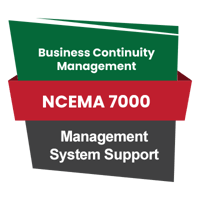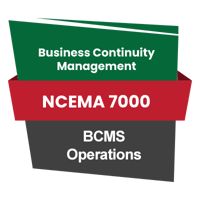Chapter 6: Management System Support
| Disclaimer |  |
Click the "NCEMA 7000 Simplified" icon to read the detailed "Disclaimer" and "Usage of this Content." | |
| Proper Usage of Guidebook | |||
Management System Support: Key Pillar of NCEMA 7000 Compliance
The "Management System Support" section is among its critical components, underscoring the importance of leadership, resources, and communication in embedding resilience into the organisation's fabric.
Management System Support is the foundation for a BCMS's success. It mandates that organisations allocate sufficient resources, establish clear communication channels, and ensure that all stakeholders are adequately trained and informed about BCM practices.
Without a robust support system, even the most well-designed continuity plans can falter during a crisis. This section of NCEMA 7000 aligns closely with global standards like ISO 22301 but is tailored to address the UAE's specific risks and operational contexts.
This article will explore the various aspects of Management System Support outlined in the NCEMA 7000 guidelines, exploring its essential elements and how they contribute to a resilient organisational framework.
By understanding these components, organisations can better prepare to implement a BCMS that complies with regulatory requirements and enhances their overall operational resilience.
Key Elements of Management System Support
Leadership Commitment
Top management must actively demonstrate their commitment to the BCMS. This includes defining roles, allocating resources, and integrating BCM into the organisation’s strategic objectives.
Resources and Competence
Organisations are required to provide adequate human, financial, and technological resources. Personnel involved in the BCMS must be competent, which requires training, awareness programs, and regular assessments to ensure skill adequacy.
Awareness and Communication
Awareness initiatives help embed a culture of resilience within the organisation. Effective internal and external communication mechanisms ensure that all stakeholders, including employees, suppliers, and regulators, are aware of the organisation’s BCM policies and procedures.
Documented Information
NCEMA 7000 requires organisations to maintain comprehensive and up-to-date documentation, including policies, objectives, risk assessments, and business impact analyses. Document control processes should ensure accessibility, security, and timely updates.
Integrating Management System Support into the BCMS Lifecycle
Management System Support intersects with all stages of the BCMS lifecycle, from risk assessment and strategy development to testing and continuous improvement.
Leadership's role in endorsing BCM objectives ensures alignment with organisational goals, while resource allocation empowers teams to respond effectively during disruptions.
Challenges and Solutions
-
Challenge: Limited organisational awareness about the importance of BCM.
Solution: Launch targeted training programs and workshops tailored to the NCEMA 7000 standard.
-
Challenge: Inadequate resource allocation.
Solution: Integrate BCM resource needs into annual budgeting processes to ensure sustainability.
-
Challenge: Complexity in maintaining documentation.
Solution: Leverage automated systems to manage, update, and secure BCM documentation.
Summing Up ...
Management System Support is not merely a supplementary component of the Business Continuity Management System; it is an essential enabler that ensures the system’s effective functioning.
Organisations that invest in robust support mechanisms—from leadership commitment and resource allocation to comprehensive communication strategies—are better equipped to handle disruptions and maintain operational continuity.
This investment in support infrastructure transforms theoretical plans into practical, actionable strategies that can be executed seamlessly in times of crisis.
The importance of this support cannot be overstated. It ensures that all aspects of the BCMS are aligned with the organisation's goals and objectives, fostering a culture of resilience that permeates every level of the organisation.
By adhering to the NCEMA 7000 guidelines on Management System Support, organisations achieve regulatory compliance and build a stronger, more adaptive operational framework that can respond effectively to emergencies' unpredictable nature.
In a rapidly changing global landscape, where risks can emerge suddenly and with significant impact, a well-supported BCMS is more critical than ever.
Organisations prioritising Management System Support as outlined in NCEMA 7000 position themselves to survive and thrive in adversity, ensuring long-term sustainability and stakeholder confidence.
|
Business Continuity Management Series: UAE National Emergency Crisis and Disaster Management Authority (NCEMA) 7000 |
||||
 |
 |
 |
 |
 |
 |
 |
 |
 |
 |
More Information About Business Continuity Management Courses

 To learn more about the course and schedule, click the buttons below for the BCM-300 Business Continuity Management Implementer [B-3] course and the BCM-5000 Business Continuity Management Expert Implementer [B-5].
To learn more about the course and schedule, click the buttons below for the BCM-300 Business Continuity Management Implementer [B-3] course and the BCM-5000 Business Continuity Management Expert Implementer [B-5].
![Register [BL-B-3]*](https://no-cache.hubspot.com/cta/default/3893111/ac6cf073-4cdd-4541-91ed-889f731d5076.png) |
 |
 |
 |
 |
 |
![FAQ [BL-B-3]](https://no-cache.hubspot.com/cta/default/3893111/b3824ba1-7aa1-4eb6-bef8-94f57121c5ae.png) |
If you have any questions, click to contact us.
|
 |
 |
 |
 |



![Email to Sales Team [BCM Institute]](https://no-cache.hubspot.com/cta/default/3893111/3c53daeb-2836-4843-b0e0-645baee2ab9e.png)

